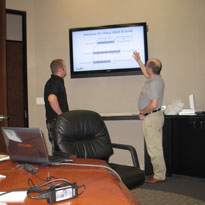RF Systems
- Course:RF Systems
- Course ID:RFSYS Duration:3 days Where: Your Office (7+ Persons)
- Download Course Description (PDF)
Available as a private, customized course for your group at your offices or ours and in some cases as a WebLive(TM) class.
Course Outline
- Introduction
- The electromagnetic spectrum
- History of RF
- Regulation of RF
- Types of RF systems
- RF applications
- RF Propagation and Fading
- Principles of RF propagation
- RF modulation basics
- Reflection, refraction, diffraction
- Digital RF communications basics
- Propagation models: Okumura, HATA, Cost 231
- Free space loss
- Reflection scatting loss, Rayleigh fading, multipath
- Multipath cancellation
- Antenna Concepts and Usage
- How antennas work
- Antenna gain
- Antenna radiation patterns
- Isotropic and dipole radiators
- Collinear vertical antennas
- Horizontal arrays, yagis, log-periodics
- Effective radiated power
- Testing and measurements
- Performance testing
- Basics of Traffic Engineering
- Trunks, circuits, overview of the T-Carrier System
- Erlang B, extended Erlang B, Erlang C
- Blocking probability, basic operational concepts towards grade of service (GoS)
- Stochastic modeling of unknown variables
- Traffic simulation
- Using calculation tools
- Design of RF Systems
- Tools available for design
- Design considerations
- Propagation losses
- Link budget
- System degradation
- Eb/No, SNR, BER, Noise
- Limitations of bandwidth
- Receiver sensitivity
- Intermodulation distortion
- RF performance and its optimization
- RF system management and Key Performance Indicators (KPIs)
- Practice link budget calculations
- Deployment of RF Systems
- Planning to undertake RF deployment projects
- RF deployment process
- Successful and unsuccessful RF deployments
- Morphology zones
- Design engineering
- Traffic engineering
- Mixers
- RF regulatory considerations
- Call processing
- Mobility management
- Soft versus Hard hand over
- RF optimization and performance testing
- Indoor design considerations
- Conclusion
- A survey of current and evolving technologies
- Directions for future study and specialization
- Course recap, Q/A, and Evaluations
Course in a Nutshell
RF systems come in a bewildering variety of forms and technologies, including satellite and terrestrial, mobile and fixed, microwave, trunked radio, HF/VHF, Blue-Tooth, and RF ID, to name a few. While these systems are diverse in design and function, they all employ radio waves as a means of communication and thus utilize concepts and techniques that are fundamental to all RF systems.
In this course, you will learn how radio waves propagate and fade, the models that describe RF propagation and fading, how antennas work and are used, the basic traffic engineering models, the principles of RF design and optimization including traffic engineering, and the process of deploying an RF system. At the end of the course, you will have a solid foundation in the concepts, principles, methods, and considerations common to all RF systems. You will then be well prepared to embark on a more detailed study of your specialized interest in RF, whether cellular/mobile, microwave, HF/VHF, satellite, or other
Customize It!
Tailor this course to your own unique requirements at little-to-no additional expense. We can teach distinct versions of this course for audiences such as:
- System designers and planners
- Equipment or application designers
- Information Technology professionals
- Drive test or cell site technicians
- Less technical audiences such as managers, executives, business planners, sales and marketing specialists, and operations and support personnel.
Aimed At
As RF systems become more varied and pervasive, there is a growing demand for engineers, technicians, and managers who understand RF. This course will benefit those new to the field who need to learn the key concepts, design principles, and deployment considerations that underlie all RF systems. The standard presentation of this course assumes technical background, though you need not be an electrical engineer to be able to take this course.
Prerequisites
At least one year experience in the field of communication engineering, fixed or wireless telephony, information technology, or other technical field.
- "The course highlights some important aspects of RF systems. The instructor did really well to keep our attention, including great explanation of concepts. Great use of images." - Systems Engineer, Leading Technology Consulting Firm

